The Cnil, guarantor of the privacy of the French, has lowered “the intensity of advertising tracking” on the Internet, in particular by reducing the number of cookies, it said in a press release on Monday.
The institution’s innovation lab (Linc) has been monitoring the practices of the 1,000 sites with the highest audience in France for more than a year. According to this study, “the proportion of sites that deposit more than 6 third-party cookies fell from 24% to 12% between January 2021 and August 2022.” The proportion of sites that do not deposit third-party cookies has increased from 20% to 29%. Finally, the average number of third-party cookies placed has gone from more than 4 to 2.5.
tracking always important
Cookies are digital trackers that websites place on the user’s terminal. They are used to persistently identify the user, to save their basket of items or their preferences. When they are deposited by a partner of the site, often for the purpose of audience measurement or advertising targeting, we speak of third-party cookies. Its use is subject to the consent of the user who must expressly accept their deposit.
If the study shows “first positive results”, “the tracking of browsing data by targeted advertising actors, without the consent of individuals, remains potentially important”, acknowledges the Cnil, which had published guidelines on the subject in 2020 .
Formal notices and heavy fines
Since then, the Commission has sent 94 formal notifications and imposed 8 sanctions. The most fond of cookies Gafa have also received large fines: 250 million euros for Google, 60 million euros for Facebook, 35 million euros for Amazon.
On the user side, a series of surveys carried out by Ifop shows that 95% of the people surveyed in 2022 claim to know what cookies are, compared to 44% in November 2020. However, 68% of them consider that information about companies in the advertising ecosystem is insufficient or non-existent.
The cookie rejection rate is also on the rise, at 39% as of June 2022. Almost the same number of internet users say they set cookies more accurately, with around 20% saying they consent each time.
Source: BFM TV


